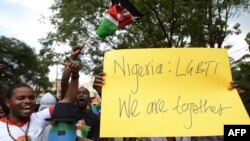Award-winning Nigerian writer Jude Dibia’s first novel, Walking With Shadows, has as its central character a gay man who lives his life as a married family man.
The title of the book is appropriate because, as Dibia explains, gay people in Nigeria do not officially exist. They are forced to live in the shadows.
Dibia said gay people in Nigeria and elsewhere in Africa are increasingly fearful of “outing” themselves because of laws and other repressive measures that discriminate against them, and these restrictions on free expression are driving LGBTI (Lesbian, Gay, Bisexual, Transgender, and Intersex) communities further underground.
“Being gay in Nigeria is so funny because you cannot admit to it,” Dibia says. “You have to pass as something else and create a different persona and live that persona. And, sometimes for some people, they end up being married and they have families and they try to suppress who they are.
“But, there is a lot of depression and struggles there,” he says.
Taboo subject in Nigeria
Dibia’s novel was one of the first to deal with the taboo subject of homosexuality in Nigeria. On a personal note, he says writing this book has allowed him to discover who he is and to make some changes in his own way of thinking and living as a gay man. He calls the experience therapeutic and says he has become more comfortable in his own skin.
He says both he and a small independent publisher in Nigeria put up the money to finance the publication of Walking With Shadows.
Dibia says bookstores in Nigeria have refused to stock the book. But, he says it has been selling by word of mouth and has become his best-selling novel in the country.
He says the book has triggered a debate on gay rights and has changed the discussion of LGBTI issues in Nigeria.
“There was a discussion that was started and that was very positive. Before people - oh you mentioned gay it is like under the table in whispers. It was such a taboo word even to say homosexual in public,” Dibia says. “But, now people could talk about homosexuals in the context of my novel without it sounding like a dirty word. It was more for discussion and a debate on the character this, the character that. So, I started more or less a sort of discussion.”
But, gay people in Nigeria are not safe.
Their sexual orientation is putting them at greater risk since the passage of Nigeria’s repressive new law on homosexuality on January 7. Gay sex is banned in 38 of Africa’s 54 countries, but the Nigerian law goes further than that.
Under the law, people in same-sex relationships can be imprisoned for 14 years. The operation of gay clubs and gatherings of gay people is forbidden and can result in a 10-year jail term.
Even public displays of affection by gay men and lesbian women are criminalized.
Chilling effect upon community
Dibia says the law is having a profoundly chilling effect upon the gay community.
“People have gone further underground, but they still are trying to survive. And, I think maybe that is why online now on the Internet and on blogs you are seeing more stories coming out,” he says.
“There is a lot of anger festering in the underbelly. … But, more stories are popping out there because of this law. And, I think it is a good thing. In its own way, it is a good thing,” Dibia says.
Dibia says he does not expect the Nigerian government to change its attitude toward homosexuality overnight. But, he is sure some change eventually will come.













